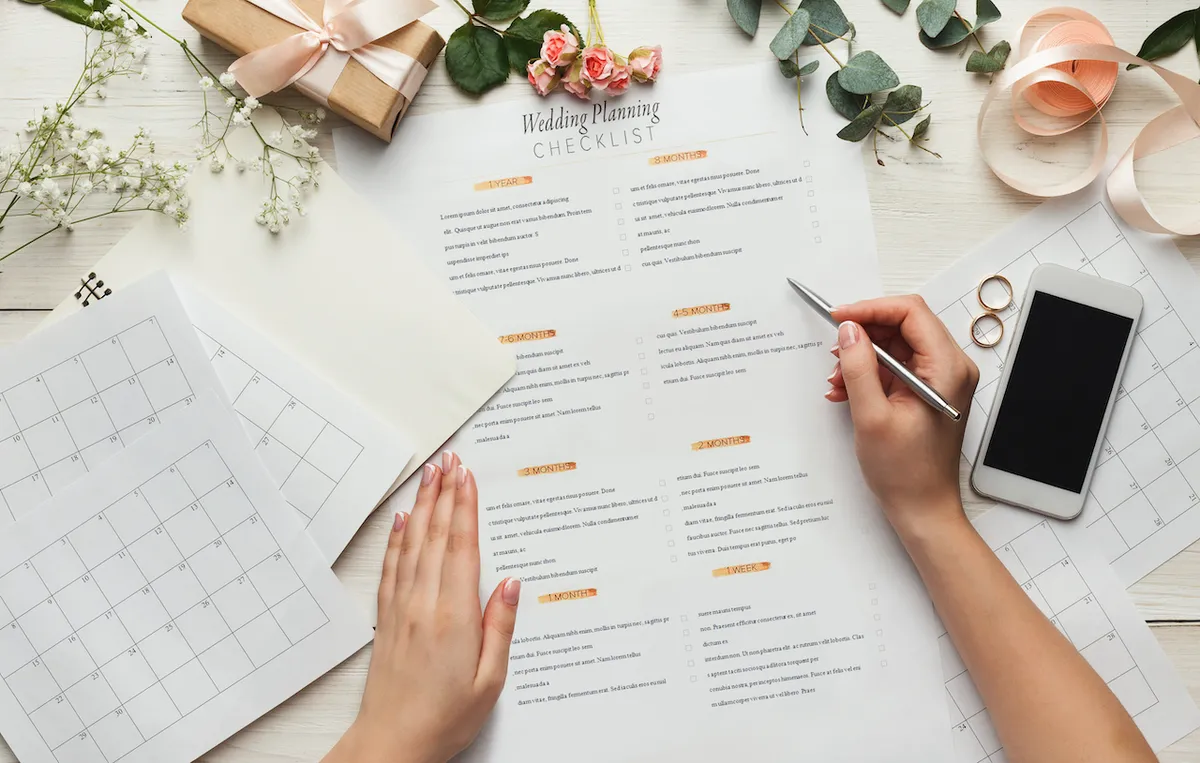
Planning a wedding is a monumental task, and finding the perfect wedding planner can make all the difference. This guide will walk you through the essential steps to choosing the ideal wedding planner who aligns with your vision, style, and budget. A wedding planner is not just a professional; they become your partner in turning your dream wedding into a reality.
A wedding planner's role extends beyond organizing logistics; they bring creativity, expertise, and industry connections to the table. With their guidance, you can navigate the intricate process of wedding planning with confidence, leaving you more time to savor the joyous moments leading up to your big day.
In this article, we will delve into the key considerations and steps that will empower you to choose the perfect wedding planner. Whether you're envisioning an intimate gathering or a grand celebration, the right wedding planner will help you craft a wedding that reflects your unique love story.
Key Takeaways
- Wedding Planning Expertise: Choosing a wedding planner is a crucial decision that requires careful consideration. Assessing their portfolio, experience, and ability to align with your vision is essential to finding the perfect match.
- Transparency in Budgeting: Open and honest discussions about your budget are vital. Your wedding planner should be able to work within your financial parameters and offer value for your investment.
- Vendor Relationships: A well-connected wedding planner can recommend trusted vendors and negotiate favorable deals, simplifying the planning process.
- Logistics and Timeline Management: Efficient management of wedding timelines and logistics is critical for a seamless celebration. A skilled planner should excel at crafting schedules, coordinating vendors, and handling unexpected challenges.
- Effective Communication: Communication is key to a successful planning partnership. Your wedding planner should keep you informed and engaged throughout the process.
- Emergency Preparedness: Your planner should have contingency plans in place to handle unforeseen challenges and ensure your wedding day proceeds smoothly.
Understanding Your Needs
Before you begin your search for the perfect wedding planner, it's crucial to have a clear understanding of your own needs and preferences. Every wedding is unique, and what works for one couple may not be suitable for another. Here are some steps to help you define your wedding planning needs:
- Wedding Vision: Start by visualizing your dream wedding. Consider the style, theme, and ambiance you want to create. Are you envisioning a romantic garden wedding, a chic urban celebration, or a rustic countryside affair?
- Guest Count: Determine the size of your guest list. The number of attendees will significantly impact the logistics and venue options.
- Budget: Establish a realistic budget for your wedding. Knowing your budgetary constraints will guide you in finding a wedding planner who can work within your financial parameters.
- Services Required: Think about the level of assistance you need. Do you want a full-service wedding planner who handles every detail, or do you only require help with specific aspects, like day-of coordination?
- Personal Involvement: Consider how involved you want to be in the planning process. Some couples prefer to be hands-on, while others want a wedding planner to take the lead.
- Wedding Date: Have a tentative wedding date or timeframe in mind. This will help you identify planners who are available on your chosen dates.
Research and Recommendations
Once you have a clearer understanding of your wedding planning needs, it's time to start your search for the perfect wedding planner. This section will explore how to gather a list of potential planners and the importance of recommendations.
- Online Research: Begin your search by exploring wedding planner profiles and websites online. Most wedding planners have an online presence that showcases their portfolio, services, and client testimonials. This can give you a preliminary sense of their style and expertise.
- Wedding Directories: Utilize wedding directories and listings to discover wedding planners in your area. These directories often provide contact information and brief descriptions of each planner's services.
- Social Media: Social media platforms like Instagram and Pinterest can be treasure troves of wedding inspiration and a great way to discover wedding planners who share your aesthetic preferences. Follow and explore the work of planners whose styles resonate with you.
- Seek Recommendations: Reach out to friends, family members, and colleagues who have recently tied the knot. Personal recommendations can be invaluable, as they come from trusted sources who have firsthand experience working with wedding planners.
- Ask Wedding Vendors: Wedding vendors, such as photographers, caterers, and florists, often collaborate closely with wedding planners. They can provide insights into planners they've worked with and recommend professionals who excel in their roles.
- Attend Bridal Shows: Bridal shows and wedding expos are excellent opportunities to meet wedding planners in person and see their work firsthand. These events often feature a variety of wedding vendors and professionals.
- Local Wedding Magazines: Check out local wedding magazines and publications. They typically feature profiles of wedding planners and showcase their recent weddings.
Check Their Portfolio
Now that you've gathered a list of potential wedding planners, the next step is to dive into their portfolios. A wedding planner's portfolio is like a window into their creativity and style. Here's how to effectively review their work:
- Diverse Wedding Styles: Look for a range of weddings in their portfolio. A skilled wedding planner should be adaptable and capable of working with various styles, whether it's a classic, modern, bohemian, or destination wedding. This diversity indicates their versatility.
- Consistency and Cohesion: Pay attention to the consistency and cohesion in their portfolio. Does their work exhibit a clear design aesthetic and attention to detail? Are there common elements that resonate with your vision?
- Real Weddings: Request to see photos and details from real weddings they've planned. These real-life examples offer a glimpse into their ability to execute their concepts and manage the logistics effectively.
- Client Testimonials: In addition to visual elements, read client testimonials and reviews. Positive feedback from past couples speaks to the wedding planner's professionalism, communication, and overall client satisfaction.
- Innovative Ideas: Assess if the planner brings innovative and unique ideas to their weddings. Creativity can make your wedding stand out and reflect your personality as a couple.
- Attention to Detail: Analyze the attention to detail in their work. Notice the small touches and thoughtful arrangements that enhance the overall wedding experience.
- Adaptability: Consider if the planner can tailor their style to match your preferences. Flexibility is key to ensuring that your wedding vision is at the forefront.
- Venue Expertise: If you already have a wedding venue in mind, check if the planner has experience working at that location. Familiarity with the venue can streamline planning and logistics.
By thoroughly examining a wedding planner's portfolio, you can gain valuable insights into their design sensibilities, creativity, and ability to bring your wedding vision to life. It's an essential step in narrowing down your choices and finding the perfect match for your special day.
Initial Consultations
Having reviewed portfolios and narrowed down your list of potential wedding planners, the next step is to schedule initial consultations with them. These meetings are pivotal in assessing their compatibility with your vision and expectations:
- Prepare questions: Before the consultation, prepare a list of questions and topics you'd like to discuss. These can include inquiries about their planning process, availability on your wedding date, and how they handle unexpected challenges.
- Discuss Your Vision: During the consultation, share your wedding vision, style, and preferences with the wedding planner. Pay attention to their responses and how well they understand and resonate with your ideas.
- Experience and Expertise: Inquire about their experience in planning weddings similar to yours. Ask about specific challenges they've encountered and how they've resolved them. Experienced planners often have valuable insights to share.
- Services Offered: Clarify the services included in their packages. Discuss whether they offer full-service planning, partial planning, day-of coordination, or other customized options. Ensure their services align with your needs.
- Availability: Confirm their availability on your chosen wedding date. If they are already booked for a similar date, inquire about their team's availability or if they can recommend another trusted planner.
- Communication: Discuss their communication style and preferred methods of contact. Effective communication is vital for a successful planning partnership.
- References: Ask for references or contact information for past clients. Speaking with couples they've worked with can provide valuable insights into their professionalism and work ethic.
- Budget Alignment: If you have a budget in mind, share it during the consultation. Ensure that they can work within your budget or provide alternatives that match your financial parameters.
- Creative Input: Assess their willingness to listen to your ideas and provide creative input. A collaborative planner who values your input can make the planning process enjoyable.
- Contract and Fees: Inquire about their contract terms, payment schedules, and any additional fees. Ensure that all financial aspects are transparent and agreeable.
These initial consultations serve as a chance to get to know the wedding planners on a personal level and evaluate how well they align with your wedding vision. Take notes during these meetings and trust your instincts when assessing compatibility. The right wedding planner will not only have the expertise but also share your enthusiasm for creating a memorable wedding day.

Budget Considerations
Your wedding budget is a crucial factor to consider when choosing the perfect wedding planner. Here's how to navigate the budget aspect of your decision:
- Budget Transparency: During your consultations, be open and transparent about your budget. Share your financial limits and ask if the wedding planner can work within that budget. A skilled planner can help you allocate funds effectively to achieve your priorities.
- Service Costs: Understand the costs associated with hiring a wedding planner. Most wedding planners offer various packages, each with its own price range. Clarify what services are included in each package and how they affect the overall cost.
- Additional Expenses: In addition to the wedding planner's fee, discuss any potential additional expenses. These could include vendor fees, travel costs (if your wedding is a destination), and any unforeseen expenses. A transparent planner will outline these clearly.
- Customized Services: Some wedding planners offer tailored services, allowing you to select only the assistance you need. If your budget is tight, explore if they can customize a package that meets your essential requirements.
- Payment Schedule: Discuss the payment schedule and terms. Some planners may require an upfront retainer fee, followed by installments leading up to the wedding. Ensure the payment plan aligns with your financial timeline.
- Value for Investment: Consider the value you're receiving for your investment. A skilled wedding planner can help you save money through vendor negotiations, avoiding costly mistakes, and efficient budget management.
- Hidden Costs: Ask about any potential hidden costs or unforeseen expenses that may arise during the planning process. A reputable planner will strive to minimize these surprises.
- Flexibility: Assess the planner's flexibility in working with your budget. They should be willing to offer creative solutions and alternatives to help you achieve your vision without exceeding your financial comfort zone.
Vendor Relationships
Another critical aspect to consider when choosing a wedding planner is their relationship with wedding vendors. A well-connected wedding planner can help you secure the best vendors for your wedding. Here's what to look for:
- Vendor Network: Inquire about the wedding planner's network of vendors. A seasoned planner should have established relationships with various vendors, including florists, caterers, photographers, and more. They can recommend trusted professionals who align with your style and budget.
- Vendor Recommendations: Ask for vendor recommendations that match your wedding vision. Evaluate whether these recommended vendors align with your preferences and budget. While you're not obligated to choose their recommendations, it's a sign of their commitment to your vision.
- Negotiation Skills: A skilled wedding planner can negotiate with vendors to secure favorable deals and pricing on your behalf. Their negotiation skills can potentially save you money and ensure you get the best value.
- Experience with Local Vendors: If you have a specific venue or local vendors in mind, inquire if the wedding planner has experience working with them. Familiarity with local vendors can streamline the planning process and enhance coordination.
- Customization: Assess the planner's ability to customize vendor recommendations based on your unique needs. They should be receptive to your preferences and open to exploring new vendor options if necessary.
- Portfolio of Collaborations: Review examples of weddings where the planner collaborated with vendors. A successful history of teamwork and well-executed weddings reflects positively on the planner's ability to manage vendor relationships.
- Vendor Reviews: Look for reviews or testimonials from past couples regarding their experiences with recommended vendors. Positive feedback from both the planner and the vendors themselves can provide peace of mind.
- Vendor Payments: Discuss how vendor payments are managed. A trustworthy planner will ensure that payments to vendors are handled efficiently, helping you avoid any payment-related issues.
- Contingency Plans: Inquire about the planner's contingency plans in case a vendor becomes unavailable. They should have backup options and solutions ready to ensure your wedding proceeds smoothly.
A wedding planner's vendor relationships can greatly influence the quality of your wedding. The ability to recommend reputable vendors and negotiate on your behalf can streamline the planning process and contribute to a flawless wedding day.
Logistics and Timeline Management
Efficient logistics and timeline management are essential for a successful wedding. Here's how to assess a wedding planner's ability to handle these crucial aspects:
- Timeline Expertise: Inquire about the planner's approach to creating and managing a wedding timeline. They should have experience crafting comprehensive schedules that outline each element of the day, from ceremony start times to reception toasts.
- Coordination: Assess their coordination skills in managing various aspects of the wedding day. A skilled planner can oversee multiple moving parts, such as coordinating vendor arrivals, ensuring that the bridal party is ready, and managing the flow of events.
- Contingency Planning: Discuss their approach to handling unexpected issues or delays on the wedding day. A proactive planner will have contingency plans in place to address common challenges like inclement weather or vendor delays.
- Rehearsal Management: If you plan to have a rehearsal before the wedding, ask how they handle rehearsal coordination. They should ensure that everyone understands their roles and responsibilities for the actual day.
- Vendor Coordination: Evaluate their ability to coordinate with various vendors to ensure seamless execution. This includes communicating timelines, setup requirements, and any special requests.
- Guest Experience: Discuss how they plan to enhance the guest experience through effective timeline management. Guests should feel informed and engaged throughout the day.
- Transportation Logistics: If transportation is needed for the wedding party or guests, inquire about their experience in organizing transportation logistics. This is especially crucial for destination weddings or venues with limited parking.
- Communication: Effective communication is key to keeping everyone on the same page. Ask how they plan to communicate timelines and updates to the bridal party, vendors, and other key stakeholders.
- Reception Flow: Discuss how they intend to manage the flow of events during the reception, including introductions, speeches, and entertainment. A well-organized planner can ensure that the reception runs smoothly.
- Emergency Preparedness: Inquire about their emergency preparedness. They should have a plan for handling unforeseen emergencies, such as medical issues or severe weather disruptions.
A wedding planner's ability to manage logistics and timelines can significantly impact the flow and success of your wedding day. They should demonstrate strong organizational skills, attention to detail, and the capability to handle unexpected challenges calmly and effectively.

Conclusion
In conclusion, finding the perfect wedding planner is a pivotal step in ensuring a seamless and memorable wedding celebration. Throughout this guide, we've explored the key factors to consider when making this crucial decision. Your chosen wedding planner should not only align with your creative vision but also possess the organizational prowess to manage budgets, vendor relationships, logistics, and timelines effectively.
Remember that open communication and a shared understanding of your expectations are vital components of a successful partnership with your wedding planner. By thoroughly assessing their portfolio, having candid initial consultations, discussing budget considerations, and evaluating their vendor connections and logistical skills, you can confidently entrust them with the task of turning your wedding dreams into a reality. With the right wedding planner by your side, you can focus on cherishing every moment of your special day while they handle the intricate details and ensure a stress-free celebration.
Get legally married online
In partnership with Courtly, get legally married online.
From start to “I do.” Courtly team is fully committed to the cause: getting you married. They've done more remote weddings than anyone. Thousands of couples have counted on Courtly and we know what it takes to secure your legal marriage certificate.
Also, enjoy an exclusive discount available only to the MarryOnChain community! Use code MARRYONCHAIN to get $75 off your wedding.
RelatedRelated articles
All posts




